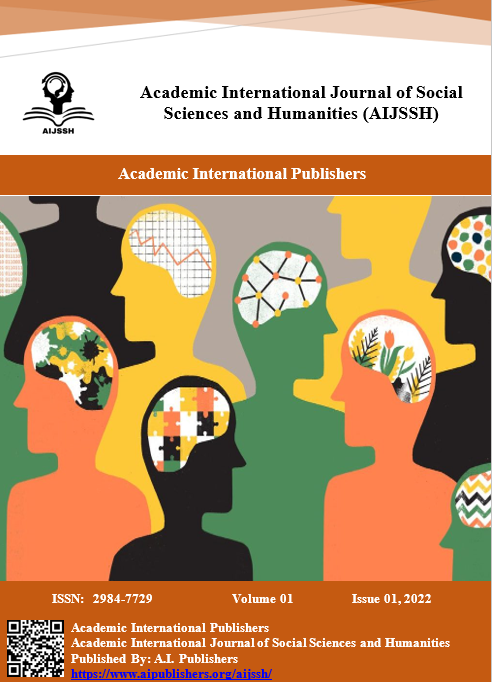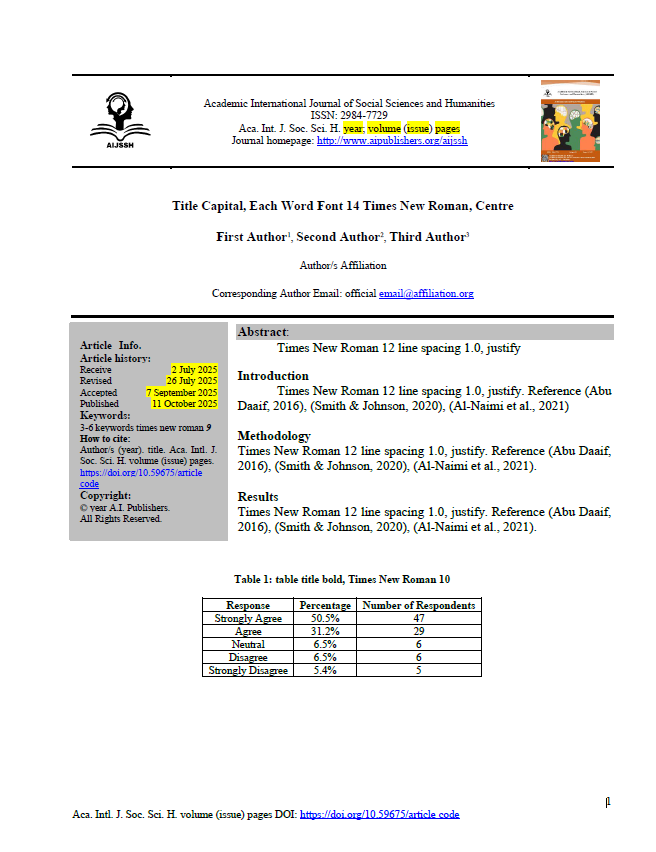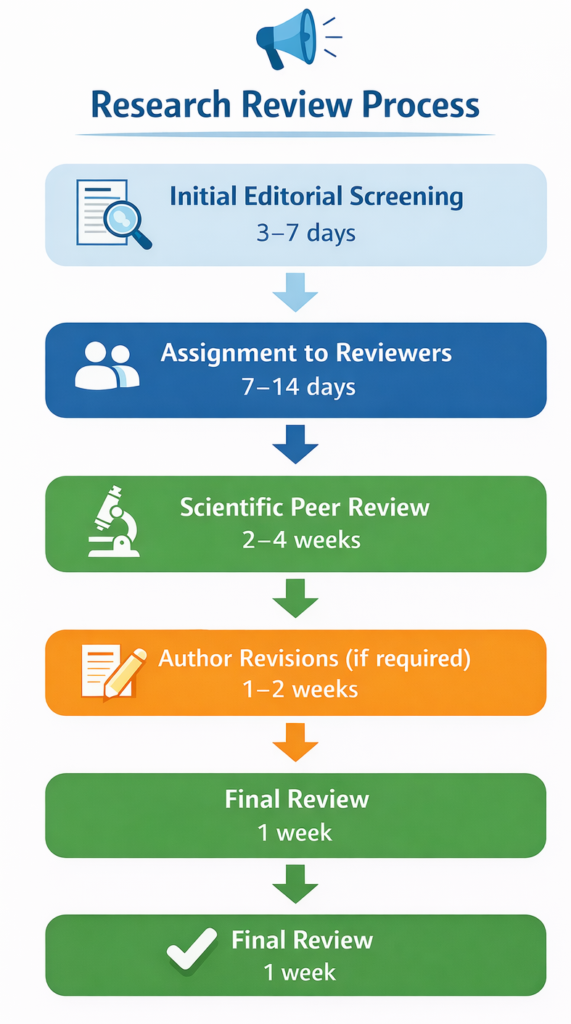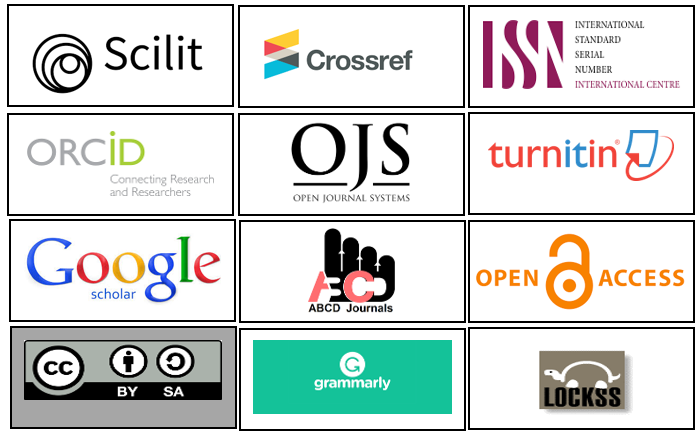Investigating the Relationship of Social Capital Perception and Knowledge Sharing by Mediation of Organizational Commitment Among all Staff of the General Education Department in Holy Karbala
DOI:
https://doi.org/10.59675/S1112022Keywords:
Social capital, sharing of knowledge, Organizational Commitment.Abstract
The study aims to investigate the relationship between the perception of social capital and knowledge sharing mediated by organizational commitment in a descriptive correlational method. The statistical population includes all employees of the General Department of Education in holy Karbala, whose number is 1000. According to Cochran's table, the sample size was 278 people who were selected by random sampling from the statistical population. The research tool is a questionnaire, so three standard questionnaires were used, such as Nahapit & Ghoshal's Social Capital (1998), Nonaka & Takeuchi's Knowledge Spiral (1995) and Meier & Allen's Organizational Commitment (1990). Supervisor, subject experts, and some of the statistical community members confirmed the face and content validity of the questionnaires. Based on Cronbach's alpha coefficient, the reliability of the social capital questionnaire, knowledge sharing questionnaire and commitment questionnaire were respectively calculated as 0.94, 0.96, and 0.76. To analyze the research data, 19Spss and 20Amos software were used. In statistical analysis, descriptive statistics were used to collect basic information such as mean, minimum and maximum value, number of data, standard deviation, frequency, and frequency percentage, and for inferential statistics, Smirnov Kolmograph test, Kruskal Wallis, Analysis of Variance (ANOVA), and independent T-test were used. The findings show that there is a significant relationship of 0.33 between social capital perception and knowledge sharing by mediation of organizational commitment. Also, there is a substantial relationship of 0.81 between social capital and knowledge sharing, as well as between commitment and knowledge sharing, with a significant relationship of 0.59, and there is a substantial relationship of 0.51 between social capital and commitment.
References
Estak, Rohollah, Abdul Maleki, Jamal (2013). Examining and explaining the impact of social capital on innovation with the role of mediator of knowledge management. Social Capital Management, Issue 1, No. 1, pp. 1-20.
Abili khodayar, farmer of Khalili, mujtaba(2012). Examining the relationship between social capital and Knowledge Management in a state insurance company. Insurance Research, Vol. 28, Number 2, pp. 129-152.
Sarlak Muhammad Ali; Eslami Tahere (2010). Knowledge sharing at Sharif industrial University: social capital approach, Journal of Public Administration, Issue 3, No. 8, pp. 1 to 18.
The jurisprudence of Abu al-Hassan, Feiz Tahere(2006).Social Capital: a non-organizational approach. Management knowledge quarterly, 72: 46-23.
Sharifzadeh Fattah, Budlayee Hassan (2008). Knowledge Management in administrative, manufacturing and service organizations. Jahad daneshgahi Allameh, Vol.1, 320 pages.
Ganji Muhammad, Helali Sotude Mina.(2010). The relationship between visual species and social capital. Applied sociology, Vol. 22, Serial No. 42 , No. 2:pp. 95-120.
Harandi Attaullah (2014). Explaining the role of social capital and knowledge sharing in organizational learning of knowledge-based companies,technology development management quarterly, 4: 161-182
Mughli Alireza, Bahmanyari Hamid, Daneshvar, Bahare, Masumi Rahim.(2015). Examination of the relationship between social capital and knowledge management at Shiraz University of Medical Sciences. Issue 6, No. 40-2: 51
Kazemzadeh Bitali Mehdi, Qasem zadeh AliShahi AbulFazl.(2013). Explaining the role and impact of social capital on organizational commitment and effective education. Organizational behavior, Vol.1, No. 2.P. 105-115.
Danesh Fard K, Zakeri M. (2010). Basic knowledge management, processes and functions. Published by Tehran, Islamic Azad University, Research Deputy. 259 pages.
Madani Hussein, Zahedi Muhammad Jawad.(2006). Prioritization of effective factors on employee organizational commitment (case study in Bidboland Gas Refining Company). The Journal of Iranian sociology, Issue 6,No. 1: pp. 3-33.
Alwani Mehdi, purezat Ali Asghar,Sayar Abolqasem.(2008). Examining the relationship between justice and organizational commitment . The Quarterly Journal of Human Resource Management in Oil Industry of the Institute of International Energy Studies, No.8:1- 4.
Khoshnud, Elham.(2011). Examination of the impact of job main dimensions on the level of employees organizational commitment of the Social Security Organization of Sanandaj.Master thesis in executive management in Islamic Azad University of Sanandaj.
Mousavi, Mozhde . (2008) .The relationship between leadership styles, decision-making styles and organizational justice dimensions in Islamic Azad Universities of Region #4 to present dependent(Pish bin) mathematical models in 2008, Master thesis, Islamic Azad University of Khorasgan branch.
Qanbari, Sirus, AbdulMaleki, Jamal. (2020). The role of social capital on job performance mediated by teamwork (case study: Employees of BouAli-Sina University). Strategic research on Iranian social issues.
Sohrabi, Atefe, YazdKhasti, Ali, SadeghiArani, Zahra, (2021). Meta-analysis of organizational factors affecting the sharing of organizational knowledge. Information Management Science and technology.
Ahangari, J., & Hayati, S. (2019). Examining the Relationship between Social Capital, Organizational Commitment and Communication Skills of Public Relations Officers of Tabriz State Organizations. Sociological studies, 11(41), 95-109.
Alexander E. Ellinger , Carolyn (Casey) Findley Musgrove , Andrea D. Ellinger, Daniel G. Bachrach,,Ayşe BanuElmadağBaş, Yu-Lin Wang .(2013). Influences of organizational investments in social capital on service employee commitment and performance. Journal of Business Research 66, 1124–1133.
Azari, A., Dashti, S., Kamani, H., Sadeghi, R., Masoudi, M. R., Naderi, Z., & Azari, H. (2021). Investigating and Modeling the Impact of Social Capital on the job Burnout of Environmental Health Workers by Investigating the Mediator of Organizational Commitment (Case Study: Environmental Health Unit Staff in Qom Health Centers).
Bhatti, S.H., Vorobyev, D., Zakariya, R. and Christofi, M. (2021), "Social capital, knowledge sharing, work meaningfulness and creativity: evidence from the Pakistani pharmaceutical industry", Journal of Intellectual Capital, Vol. 22 No. 2, pp. 243-259.
Baharloo. A, M. A. Naghavi(2012). The role of social capital in organizational commitment improvement at Iran National Oil products distribution company, Social Science Research Network, pp. 1-22.
Berggren;"The rational-legal framework and embeddedness in localsocial capital networks"; Journal of Enterprising Communities: Peopleand Places in the Global Economy, Vol. 3, No. 2, 2009.
Celep, C. (2000). Teachers' Organizational Commitment in Educational Organizations. In National Forum of Teacher Education Journal (Vol. 10, No. 3, pp. 1999-2000). For full text: http://www. nationalforum. com/17celep. htm..
Celep, C., &Yilmazturk, O. E. (2012). The relationship among organizational trust, multidimensional organizational commitment and perceived organizational support in educational organizations. Procedia-Social and Behavioral Sciences, 46, 5763-5776.
Chang, Hsin.Hsin, Chuang,Shuang.Shii.( 2011)”Social capital and
Chaudhary, A., Islam, T., Ali, H. F., & Jamil, S. (2013). Can paternalistic leaders enhance knowledge sharing? The roles of organizational commitment and Islamic work ethics. Global Knowledge, Memory and Communication, 72(1/2), 98-118.
Chen, Jiun-Shiu., Lovvorn, Al S. (2011). The speed of knowledge transfer within multinational enterprises: the role of social capital. International Journal of Commerce and Management, 21(1), 46-62.
Ching-Sheue FU)2014) An Exploration of the Relationship between Psychological Capital and the Emotional Labor of Taiwanese Preschool Teachers Journal of Studies in Social Sciences ISSN 2201-4624 Volume 7, Number 2, 2014, 226-246 © Copyright 2014 the authors. 226.
Choi K,PoonS,Davis G.(2008). Effects of knowledge management strategy on organizational performance : A complementarity theory – bassed approach Omega.36:235.
Connelly , Catherine & E. Kevin Kelloway, (2003). Predictors ofemployees’ perceptions of knowledge sharing cultures. Journal:Leadership& Organization Development Journal, 2003. p.p.294 –301.
Demirel, Y., &Goc, K. (2013). The impact of organizational commitment on knowledge sharing. In 1st Annual International Interdisciplinary Conference (pp. 954-963).
Eydi, H. (2016). The effects of social capital and job satisfaction on employee performance with organizational commitment mediation role) Case Study, Youth and Sports Ministry). Organizational Behavior Management in Sport Studies, 2(4), 11-24.
Falkenburg,k.,&Schyns,B.(2007).Managment research news ,vol,30.10:708-723.
Feng, C., Bai, C., & Kang, Y. (2013). Historical social capital and contemporary private investment choices. Journal of Corporate Finance, 79, 102365.
Hamidi, R., Barari, R., Sahebdel, F., &Bayat, F. (2013). Evaluating the Model of Causal Relations between Organizational Identity and Organizational Commitment in Hospital Nursing Staff through the Mediation of Organizational Culture. Employee Responsibilities and Rights Journal, 1-22.
Hermawanto, A. R., Ahman, E., &Supriadi, Y. N. (2021). Mediation Effects of Organizational Commitment between Organization Citizenship Behavior, Transformational Leadership, and Quality of Work Life. Quality-Access to Success, 23(189), 107-117.
individual motivations on knowledge sharingParticipant involvement as a moderator”, Information& management 48, 9-18.
Khan, M. L., Salleh, R., Shamim, A., &Hemdi, M. A. (2013). Role-play of employees' protean career and career success in affective organizational commitment. Asia-Pacific Journal of Business Administration.
Lee lock. 2005,Knowledge management tool and techniques , ehsevier Butterworth.
Martınez, Ricardo., Jand, Francisco., Ruiz-Palomino, Pablo. (2012). Knowledge acquisition’s ediation of social capital-firm innovation. Journal of Knowledge Management, 16(1), 61-76.
Miokovic, S., &Keam, H. (2013). Social Capital: Creating Connections to Foster Community Innovation. Social Innovations Journal, 17.
Muneer, S., Iqbal, S. M. J., Saif-Ur-Rehman, K., & Long, C. S. (2014). An incorporated structure of perceived organizational support, knowledge-sharing behavior, organizational trust and organizational commitment: A strategic knowledge management approach. Pakistan Journal of Commerce and Social Sciences (PJCSS), 8(1), 42-57.
Pratama, E. N., Suwarni, E., &Handayani, M. A. (2021). The Effect of Job Satisfaction and Organizational Commitment On Turnover Intention With Person Organization Fit As Moderator Variable. Aptisi Transactions on Management (ATM), 6(1), 74-82.
Sayadi, E., &Hayati, A. (2014). The relationship between social capital and organizational commitment of employees in Zanjan education organization:(a case study). International Journal of Academic Research in Economics and Management Sciences, 3(5), 166.
Tsai,Yuan-Hui.Ma.,Hwa-Chun , Lin, Chieh-Peng, Chiu, Chou- Kan,. Che,Shwu- Chuan. (2014).”Group social capital in virtual teaming contexts A moderating of role positiveaffectivetone in knowledgesharing”, technological forecasting& social chang 86,13-20
Vigliarolo, F. (2021). From financialization to economic socialization: the meso-economy and the ethic social capital concepts to change the social order in modern democracies. Review of Evolutionary Political Economy, 3(1), 227-254.
Watson, G. W., &Papamarcos, S. D. (2002). Social capital and organizational commitment. Journal of business and psychology, 16, 537-552.
Wong, A. (2013). How social capital builds online brand advocacy in luxury social media brand communities. Journal of Retailing and Consumer Services, 70, 103143.
Yamaguchi, I. (2013). A Japan–US cross-cultural study of relationships among team autonomy, organizational social capital, job satisfaction, and organizational commitment. International Journal of Intercultural Relations, 37(1), 58-71.
Yusuf, Y., Heriyanto, M., Waluyo, T. J., Fadli, M., &Febrian, A. F. (2021). Social Capital: A Literature Review In Resources Management. International Journal of Educational Research and Social Sciences (IJERSC), 2(5), 1164-1172.
Downloads
Published
Issue
Section
License
Copyright (c) 2022 Academic International Journal of Social Sciences and Humanities

This work is licensed under a Creative Commons Attribution 4.0 International License.






